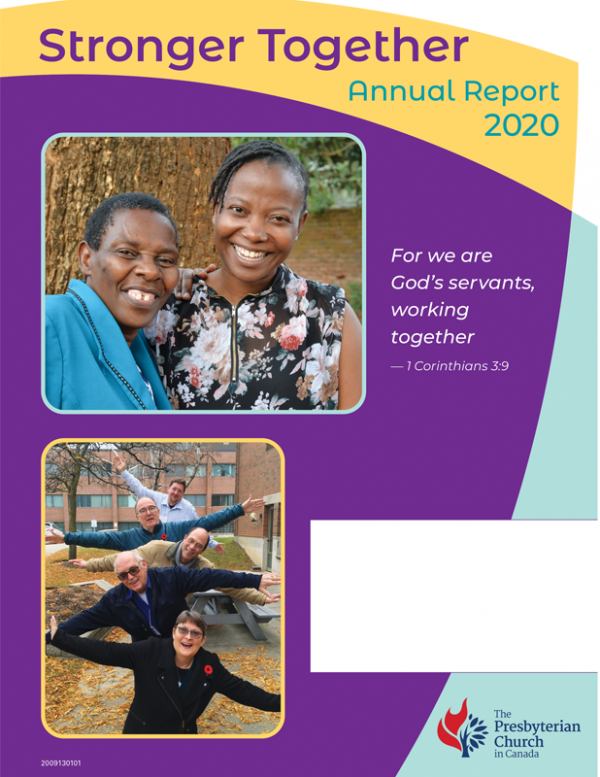Worship – online
Food Bank
Hope Clothing
World Day of Prayer -Today!
Our daily devotion for March 4, 2021
Food Bank
Minister’s Report on 2020
Rev. Scott McAndless

How do you report on a year like 2020? So many of the conventional approaches to annual reports simply do not work this year. If you were, for example, to compare 2020 to any previous year, like say 2019, in order to see how well you did, it would be like comparing apples to oranges but if you were comparing apples from the finest orchard in all the world to oranges that had been going bad in the bottom of the fridge for several months! We’ve never quite experienced a year like 2020 so we don’t have much to compare it to.
If we want to see how we have done in this past year, I think we are best to stick to one simple measure: how have we grown? 2 Peter 3:18 suggests that our most basic job as Christians is to “grow in the grace and knowledge of our Lord and Saviour Jesus Christ.” And growth in these things is always possible. So, here is how I have seen myself grow in the past year.
I have grown by being and becoming a…
- Pastoral care supporter. During this past year, I tried to work at connecting with the people of the congregation and give them whatever support I was able to with God’s help. In many ways, I would say that I put more effort into that, more creativity and certainly more time than in many previous years. But, given the limitations that we were working under, I often felt most dissatisfied with the connection and support I was able to give. It is odd, in some ways we are so able to connect in these times, but in others we feel so very far apart. I pray that, whatever challenges come ahead, God give us the strength and wisdom to face them together.
- Content creator. Now, ministers have always been in the content creation business. Content is just a general term for any sort of media that is made available either in print or online. So sermons are content, as are things like Bible studies. But in 2020, I certainly learned a lot about producing content that is more widely available and that connected with people in new ways. During the year, I produced up to seven weekly videos that were posted on YouTube, I produced and posted extensive written content as well as audio content in the form of podcasts. In many ways, I can say that I connected with more people using these media during the year then I likely have during any other year of my ministry. Now, that doesn’t mean that I made better contact or more meaningful contact, but it does mean that we can grow in some pretty interesting ways in terms of the impact of what we do even in times like these.
- Internet analytics interpreter. How do I know about any of the things that I mentioned above? It is because I’ve learned a great deal, in this past year, about interpreting the analytical information that is available on audio and video platforms and in web page design tools. I never really wanted to learn about any of these things but has become a necessary part of ministry these days, it seems.
- Social media influencer. In order to get that kind of attention in the modern world, I’ve had to learn a lot about how to disseminate and promote information through social media. Who would have ever thought that that would be a necessary part of ministry? But it has become so in 2020 and will likely only be more so in the years to come.
- Online worship leader. I have many years of experience leading worship in many different kinds of facilities, but, until a year ago, I had never even experienced worship in a virtual community. Our zoom worship services have been a huge learning experience for all of us. There have been some difficult lessons, like learning the necessity of keeping a handle on who is in attendance and making sure that there are enough co-hosts to handle that. There is so much how about our worship in the past year that has not measured up to what we would like. We have missed music and certain forms of connection. But I think there have also been positive effects as we have been able to connect in new ways. It has been wonderful to be able to be creative about some of that. I have also really appreciated the ways in which we can share our prayer requests in that format much more interactively than we ever achieved before.
- Public health official. One thing I have not relished in the past year is having to be in the position, with the support of some others, to make difficult decisions about access to the building and the health and safety of everyone involved. I have tried to do my best to balance the need for safety with the good that we can do through ministry in the building, but I never found it to be easy.
So those are some of the areas of growth that I have noticed in the past year. I am sure, if you look back and take stock, you will discover a great deal of growth has taken place for you too. That is one of the wonders that comes with living as a disciple of Christ, who brings us growth both in the easy seasons of life and in the difficult ones.
May God richly bless you in 2021 and may you continue to see growth, even as many things get much better.
Respectfully submitted, Scott McAndless